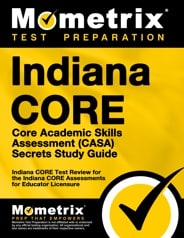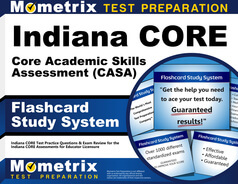The Indiana CORE Core Academic Skills Assessment (CASA) is a customized educator licensure assessment designed to measure a candidate’s knowledge and skills in relation to the REPA Indiana Educator Standards.
As of July 2019, this exam is no longer a requirement to be eligible for EPP entry.
Click “Start Test” above to take a free CASA practice test!
CASA Practice Tests by Subject
If you need some extra practice in a specific subject, click one of the subjects below to get started on a subject-specific CASA practice test.
CASA Exam Outline
The CASA exam is comprised of three subtests: Reading, Mathematics, and Writing. There are 123 questions in total, and it will take you 4.5 hours to complete all three subtests.
1. Reading (40 questions)
The Reading subtest contains 40 multiple-choice questions and has a time limit of 75 minutes. The questions in this subtest are split into two domains:
The questions in this domain are designed to test your ability to understand the meaning of various words and phrases, as well as your ability to identify the main idea, supporting details, and text structure of a text.II. Critical and Evaluative Reading
The questions in this domain are designed to test your ability to identify an author’s purpose and point of view within a text, as well as your critical reasoning skills.
2. Mathematics (40 questions)
The Mathematics subtest contains 40 multiple-choice questions and has a time limit of 90 minutes. The questions in this subtest are split into two domains:
The questions in this domain test your knowledge and skills related to numbers and quantities, as well as algebra and functions.II. Geometry and Statistics
The questions in this domain test your knowledge and skills related to measurements and geometry, as well as statistics and probability.
To assist you with this subtest, you will be given a two-page formula sheet that outlines definitions of mathematical symbols, unit conversions, and several formulas.
3. Writing (43 questions)
The Writing subtest contains 42 multiple-choice questions and one constructed-response question, and you are given a time limit of 105 minutes. The questions in this subtest are split into two domains:
The questions in this domain test your knowledge of what clear and coherent writing is, as well as what strong and developed writing is. You will also be tested on your knowledge of grammar, language usage, and English language mechanics.II. Writing Assignment
The only question in this domain is the constructed-response question, which requires you to write out a response based on a given prompt. Specifically, you will be given two passages that contain opposing viewpoints on an educational issue, and you must write a response to these passages in 400-600 words.
Check Out Mometrix's Indiana CASA Study Guide
Get practice questions, video tutorials, and detailed study lessons
Get Your Study Guide
How to Pass
Think you aren’t a good test-taker? Maybe on a study-time crunch? Or just don’t know how to begin studying? Mometrix has designed a new Study Secrets course to help every student, no matter what study scenario you are in. Here’s what you’ll find in the Study Secrets Course:
- Techniques to Conquer Procrastination
- Steps to building a Study Plan custom to your learning style
- 7 Effective Note-Taking Methods
- Test-Taking Tips
- Memory Techniques and Mnemonics
- And much more!
Everyone learns differently, so we’ve tailored our Study Secrets Course to ensure every learner has what they need to prepare for their upcoming exam or semester. Click below to check it out!
Registration
To register for the exam, you need to create an NES account on their website. From there, you can register for the exam and schedule an exam date. You can choose to take all three subtests together, or you can schedule a different testing session for each subtest (note that all subtests must be taken to pass the CASA exam).
The examination fee for each subtest is $38.
Test Day
On the day of the exam, you should arrive at the testing center 15-30 minutes prior to the scheduled exam time. This gives you plenty of time to get checked in. Once you arrive, you will be asked to present a valid form of photo ID (a photocopy of your ID will not be accepted). If your ID is invalid or you forget to bring it to the testing center, you will not be permitted to take the exam.
You will be asked to leave all prohibited items in a locker outside the testing area. This includes your phone, any electronic communication device, calculator, bag/purse, hat, food, weapons, and any smoking/vaping devices. If you wear eyeglasses, they will need to be inspected before you enter the testing room.
Once you enter the testing room, you will be asked to sign an NDA, and you will be given a brief tutorial on the testing system. Once you complete the tutorial, your exam will begin.
You will be able to take restroom breaks during the exam, but the timer will not be stopped while you are away.
The CASA exam is scored based on the number of questions you answered correctly, which is known as the raw score. This raw score is converted into a scaled score, ranging from 100 to 300. To pass the exam, you must achieve a scaled score of at least 220 on each subtest. If you fail one of the subtests, you will not pass the exam as a whole.
You will see a preliminary score report on your screen immediately after taking the Reading and Mathematics subtests, and your official score report for those subtests will be available 10 days after testing. Your score for the Writing subtest will be available 20 days after testing.
Retaking the Exam
If you did not pass the exam, you may retake it after a 30-day waiting period.
Check Out Mometrix's Indiana CASA Flashcards
Get complex subjects broken down into easily understandable concepts
Get Your Flashcards
Study Tips
How to Study Effectively
Your success on CASA test day depends not only on how many hours you put into preparing but also on whether you prepared the right way. It’s good to check along the way to see whether your studying is paying off. One of the most effective ways to do this is by taking CASA practice tests to evaluate your progress. Practice tests are useful because they show exactly where you need to improve. Every time you take a free CASA exam practice test, pay special attention to these three groups of questions:
- The questions you got wrong
- The ones you had to guess on, even if you guessed right
- The ones you found difficult or slow to work through
This will show you exactly what your weak areas are and where you need to devote more study time. Ask yourself why each of these questions gave you trouble. Was it because you didn’t understand the material? Was it because you didn’t remember the vocabulary? Do you need more repetitions on this type of question to build speed and confidence? Dig into those questions and figure out how you can strengthen your weak areas as you go back to review the material.
Answer Explanations
Additionally, many CASA practice tests have a section explaining the answer choices. It can be tempting to read the explanation and think that you now have a good understanding of the concept. However, an explanation likely only covers part of the question’s broader context. Even if the explanation makes sense, go back and investigate every concept related to the question until you’re positive you have a thorough understanding.
Comprehend Each Topic
As you go along, keep in mind that the CASA practice test is just that: practice. Memorizing these questions and answers will not be very helpful on the actual test because it is unlikely to have any of the same exact questions. If you only know the right answers to the sample questions, you won’t be prepared for the real thing. Study the concepts until you understand them fully, and then you’ll be able to answer any question that shows up on the test.
Strategy for CASA Practice
When you’re ready to start taking practice tests, follow this strategy:
- Remove Limitations. Take the first test with no time constraints and with your notes and CASA study guide handy. Take your time and focus on applying the strategies you’ve learned.
- Time Yourself. Take the second practice test “open book” as well, but set a timer and practice pacing yourself to finish in time.
- Simulate Test Day. Take any other practice tests as if it were test day. Set a timer and put away your study materials. Sit at a table or desk in a quiet room, imagine yourself at the testing center, and answer questions as quickly and accurately as possible.
- Keep Practicing. Keep taking practice tests on a regular basis until you run out of practice tests or it’s time for the actual test. Your mind will be ready for the schedule and stress of test day, and you’ll be able to focus on recalling the material you’ve learned.
FAQs
Q
Is the CASA exam required for entry into an Indiana EPP?
A
As of July 2019, this exam is no longer a requirement to EPP admission in the state of Indiana.
Q
How many questions are on the CASA exam?
A
There are 123 questions on the exam.
Q
How long is the CASA exam?
A
The total time limit for the exam is 4.5 hours.
Q
What is the passing score for the CASA exam?
A
To pass the exam, you must achieve a scaled score of 220 on each subtest.
Q
How much does the CASA exam cost?
A
The exam fee for each subtest is $38.


